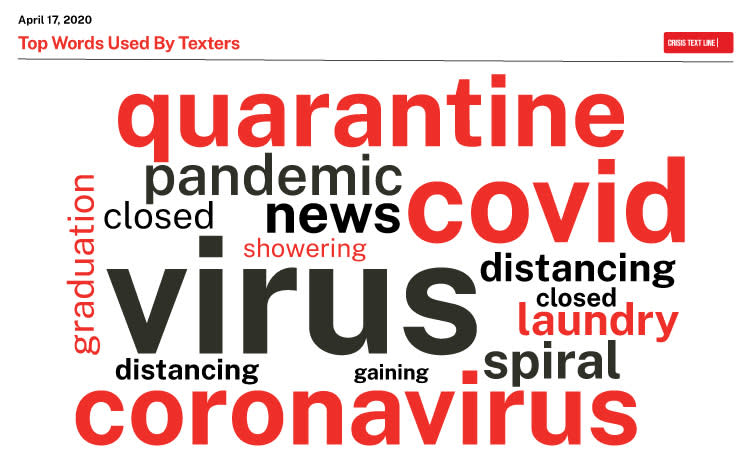'Grandma' and 'Grandpa' among top words trending in crisis text line grief conversations

A new report from the Crisis Text Line, a nonprofit that provides free peer counseling via texts to those experiencing a mental health crisis, says that keywords in texts reveals a snapshot of some of the mental health struggles Americans are encountering during the coronavirus pandemic.
The words “Grandma” and “Grandpa” are trending among the top five words in grief conversations via texts with counselors this month. The organization says the texts reveal that grief and depression are on the rise among its users.
“They're feeling isolated from others and feeling left out,” says Ashley Womble, head of communications for the Crisis Text Line. “They have little interest in doing things, they can't stop worrying. These are reasons that you would typically need to go see a therapist or talk to your primary care provider.”
It has found that, one month into the quarantine, the kinds of mental health crises people are experiencing are changing and evolving as the pandemic wears on.
“What we're seeing now is that more people are reaching out to us about depression and isolation. And fewer people now are reaching out to us about anxiety than they had been previously in the week,” Womble tells Yahoo Life. “It means that there's side effects to the quarantines that are getting more serious.”
“I think everybody has started to realize that we're in a chronic reality as opposed to an acute reality,” says Dr. Ken Duckworth, chief medical director of the National Alliance on Mental Illness (NAMI) and an assistant clinical professor at Harvard University Medical School. “I think we're just getting into a new normal of this, which is going to be ongoing. “
He says the unknowable quality of how life is going to change is difficult for many people right now. “Anxiety is a natural response to uncertainty and threat,” he says. “And what do we have here? Uncertainty and threat. And the unknowable nature of it, it's really hard.”
The Crisis Text Line has also seen conversations from health care and essential workers increase fourfold in the last month; 19 percent of those who texted reported being an essential worker. Of those, 38 percent are in health care. And 92 percent of emergency service workers, including EMT, police and firefighters, who sought help from Crisis Text Line reported experiencing stress due to the coronavirus, while 90 percent felt lonely or isolated, and 35 percent were distressed about potentially contracting COVID-19.
Some of the top words being texted include: precaution, gloves, risk and careful.
Duckworth says he believes there will be another kind of crisis for first responders after the immediate health care crisis ebbs: a mental health one. He points to a study published in JAMA in March, which surveyed health care workers on the front line of the COVID-19 pandemic in Wuhan, China. Of those surveyed, 50 percent had symptoms of depression. They also reported anxiety and insomnia. The study concluded these workers have a high risk of developing unfavorable mental health outcomes and may need psychological support.
“I am worried about the mental health of all the people on the front line of this,” he says. “Given what we know about servicemen returning from theaters of war, there's delayed effects in mental health. Our curve [for mental health] is going to look different than the viral curve. It's not going to come down as fast.”
The Crisis Text Line provides 24/7 support for those in crisis. Text 741741 from anywhere in the U.S. to communicate with a trained crisis counselor.
For the latest coronavirus news and updates, follow along at https://news.yahoo.com/coronavirus. According to experts, people over 60 and those who are immunocompromised continue to be the most at risk. If you have questions, please reference the CDC’s and WHO’s resource guides.
How to maintain your physical and mental health during the pandemic
Taking care of a loved one with COVID-19? Here’s how to stay healthy
Q&A with Dr. Kavita Patel: How to keep your family safe and maintain your mental health
Read more from Yahoo Lifestyle
Teens who vape may be at more risk of serious infection from the coronavirus — here’s why
Engineers say ‘incredible’ mothers are donating breast pumps to use as coronavirus ventilators
Want daily lifestyle and wellness news delivered to your inbox? Sign up here for Yahoo Life’s newsletter.


